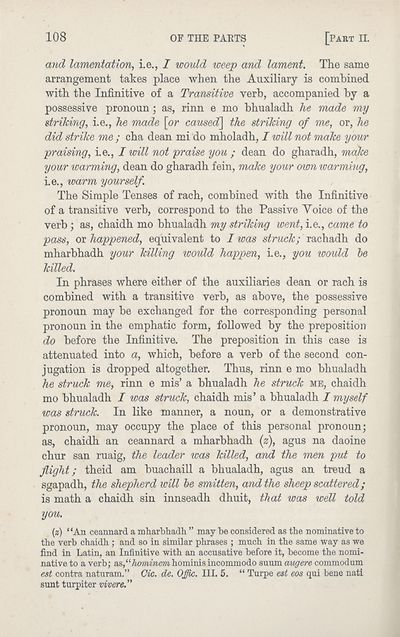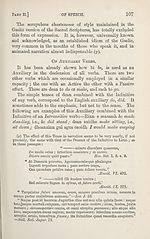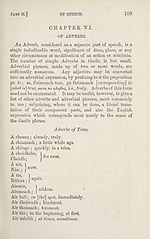Books and other items printed in Gaelic from 1871 to 1900 > Elements of Gaelic grammar
(128) Page 108
Download files
Complete book:
Individual page:
Thumbnail gallery: Grid view | List view

108
OF THE PARTS
[Part II.
and lamentation, i.e., I would weep and lament. The same
arrangement takes place when the Auxiliary is combined
with the Infinitive of a Transitive verb, accompanied by a
possessive pronoun ; as, rinn e mo bhualadh he made my
striking, i.e., he made [or caused] the striking of me, or, he
did strike me ; cha dean mi do mholadh, I will not make your
praising, i.e., I will not praise you ; dean do gharadh, make
your warming, dean do gharadh fein, make your oion warming,
i.e., warm yourself.
The Simple Tenses of rach, combined with the Infinitive
of a transitive verb, correspond to the Passive Voice of the
verb ; as, chaidh mo bhualadh my striking went, i.e., came to
pass, or happened, equivalent to I was struck; rachadh do
mharbhadh your killing would happen, i.e., you would be
killed.
In phrases where either of the auxiliaries dean or rach is
combined with a transitive verb, as above, the possessive
pronoun may be exchanged for the corresponding personal
pronoun in the emphatic form, followed by the preposition
do before the Infinitive. The preposition in this case is
attenuated into a, which, before a verb of the second con¬
jugation is dropped altogether. Thus, rinn e mo bhualadh
he struck me, rinn e mis’ a bhualadh he struck me, chaidh
mo bhualadh I was struck, chaidh mis’ a bhualadh I myself
was struck. In like manner, a noun, or a demonstrative
pronoun, may occupy the place of this personal pronoun;
as, chaidh an ceannard a mharbhadh (z), agus na daoine
chur san ruaig, the leader was killed, and the men put to
flight; theid am buachaill a bhualadh, agus an treud a
sgapadh, the shepherd will be smitten, and the sheep scattered;
is math a chaidh sin innseadh dhuit, that was well told
you.
(z) “An ceannard a mharbhadh ” may be considered as the nominative to
the verb chaidh ; and so in similar phrases ; much in the same way as we
find in Latin, an Infinitive with an accusative before it, become the nomi¬
native to a verb; a,s,“hominem hominis incommodo suum augere commodum
est contra naturam.” Cic. de. Ojjic. III. 5. “ Turpe est eos qui bene nati
sunt turpiter vivere.”
OF THE PARTS
[Part II.
and lamentation, i.e., I would weep and lament. The same
arrangement takes place when the Auxiliary is combined
with the Infinitive of a Transitive verb, accompanied by a
possessive pronoun ; as, rinn e mo bhualadh he made my
striking, i.e., he made [or caused] the striking of me, or, he
did strike me ; cha dean mi do mholadh, I will not make your
praising, i.e., I will not praise you ; dean do gharadh, make
your warming, dean do gharadh fein, make your oion warming,
i.e., warm yourself.
The Simple Tenses of rach, combined with the Infinitive
of a transitive verb, correspond to the Passive Voice of the
verb ; as, chaidh mo bhualadh my striking went, i.e., came to
pass, or happened, equivalent to I was struck; rachadh do
mharbhadh your killing would happen, i.e., you would be
killed.
In phrases where either of the auxiliaries dean or rach is
combined with a transitive verb, as above, the possessive
pronoun may be exchanged for the corresponding personal
pronoun in the emphatic form, followed by the preposition
do before the Infinitive. The preposition in this case is
attenuated into a, which, before a verb of the second con¬
jugation is dropped altogether. Thus, rinn e mo bhualadh
he struck me, rinn e mis’ a bhualadh he struck me, chaidh
mo bhualadh I was struck, chaidh mis’ a bhualadh I myself
was struck. In like manner, a noun, or a demonstrative
pronoun, may occupy the place of this personal pronoun;
as, chaidh an ceannard a mharbhadh (z), agus na daoine
chur san ruaig, the leader was killed, and the men put to
flight; theid am buachaill a bhualadh, agus an treud a
sgapadh, the shepherd will be smitten, and the sheep scattered;
is math a chaidh sin innseadh dhuit, that was well told
you.
(z) “An ceannard a mharbhadh ” may be considered as the nominative to
the verb chaidh ; and so in similar phrases ; much in the same way as we
find in Latin, an Infinitive with an accusative before it, become the nomi¬
native to a verb; a,s,“hominem hominis incommodo suum augere commodum
est contra naturam.” Cic. de. Ojjic. III. 5. “ Turpe est eos qui bene nati
sunt turpiter vivere.”
Set display mode to:
![]() Universal Viewer |
Universal Viewer | ![]() Mirador |
Large image | Transcription
Mirador |
Large image | Transcription
Images and transcriptions on this page, including medium image downloads, may be used under the Creative Commons Attribution 4.0 International Licence unless otherwise stated. ![]()
| Rare items in Gaelic > Books and other items printed in Gaelic from 1871 to 1900 > Elements of Gaelic grammar > (128) Page 108 |
|---|
| Permanent URL | https://digital.nls.uk/106560813 |
|---|
| Description | Out-of-copyright books printed in Gaelic between 1631 and 1900. Also some pamphlets and chapbooks. Includes poetry and songs, religious books such as catechisms and hymns, and different editions of the Bible and the Psalms. Also includes the second book ever published in Gaelic in 1631. |
|---|

